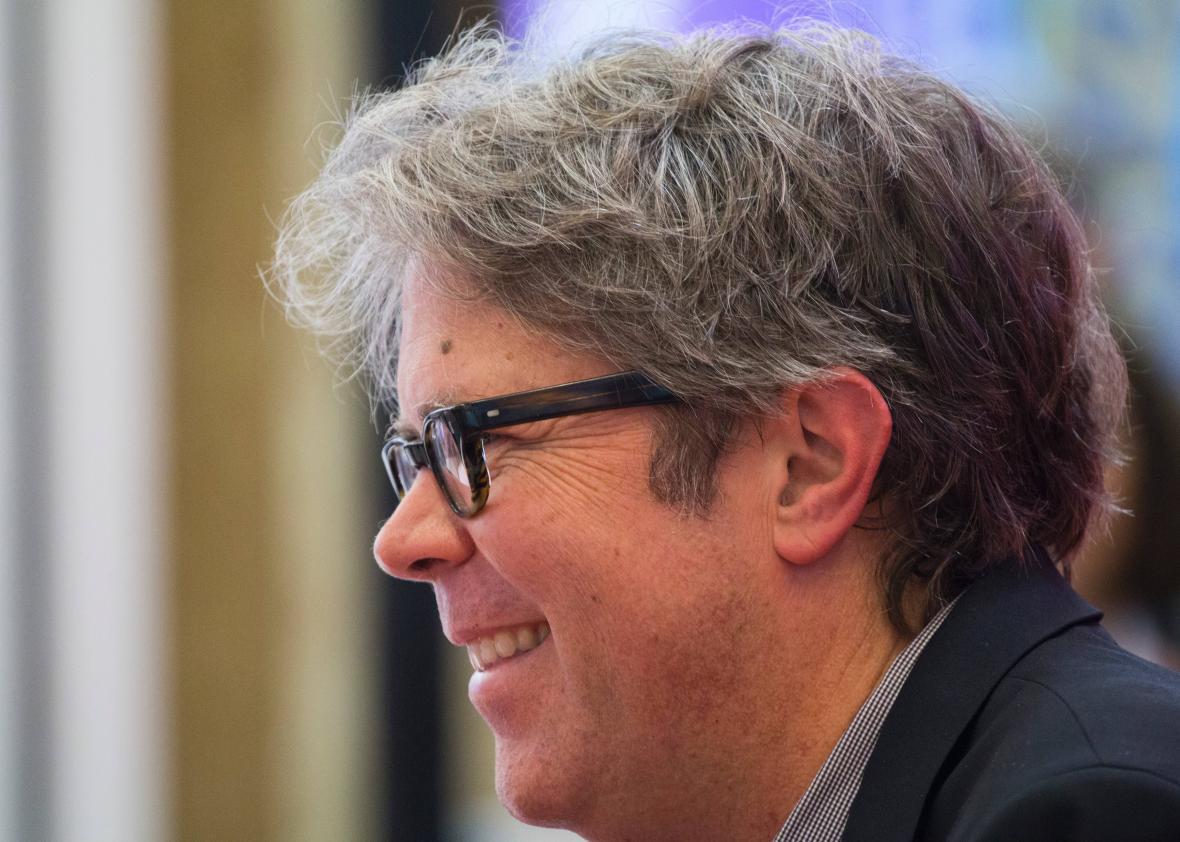Jonathan Franzen blinks in the light as a young woman with a microphone pelts him with words for a free association game.
“The 2016 election!”
He looks distinctly uncomfortable. But he decides to be a good sport.
“Fun to … watch,” he says, choosing the cheerful phrase with care.
“Social media!”
Oh, he knows what they want. Screwing up his face, the famously Twitter-averse novelist replies:
“Yuck!”
Franzen, dressed per central casting in an elegant black jacket, dark jeans, and glasses, is chatting with reporters onstage before taping begins for his game of Jeopardy: Power Players. He’ll compete against conservative commentator S.E. Cupp, pert and fierce in a fuchsia dress, and returning champion and Meet the Press host Chuck Todd, who lopes onstage with the telegenic confidence of a pro. They are the first three of 15 “newsmakers, influencers, political figures, journalists, and others” congregated in the nation’s capital for the Power Players contest, which taped all day on Sat., April 9 at the Daughters of the American Revolution Constitution Hall, and will air Monday, May 16. (Other famous names, who taped at different times, include Anderson Cooper, Louis C.K., Lara Logan, and Matthew Weiner.)
Is he nervous?
“Of course I’m nervous,” Franzen says. “This is a nightmare-come-true. Look at S.E. Cupp, she’s radiating competition.”
Is he competitive?
“Yes, as a fiction writer, or when I’m playing tennis. But today”—he pauses, swallows—“What I’d most like to get out of this is not to have to live in shame.”
That and novelistic fodder, maybe?
The pained expression twists politely. “Maybe.”
Behind him, an enormous painted American flag ripples between fake stone columns; golden eagles grip the balcony ledge; a seated statue of Lincoln grimaces at the spectacle. Black-clad production assistants in sensible shoes throng around the three contestants, adjusting mics and smoothing clothes. “My strategy,” Cupp begins to confide to the camera, then trails off as a handler whispers in her ear. When I look back at Franzen, he is saying, “… and chemical elements, I’m really good on inert gases.”
Next the press is shuffled into the audience, and the rehearsal round begins, presided over by an Alex Trebek stand-in. (Hispanic and slight in his dapper suit, he does not look like Trebek.) U.S. Geography for $200. Chores for $800. Chat for $1,000. They’re getting into it. For the final practice question, the trio must write down a literary character whose statue stands outside the Baker Street subway stop in London. Jeopardy theme music swirls from invisible speakers, familiar as a friend’s voice. The contestants look nonplussed.
“Who is Paddington Bear?” writes Chuck Todd.
“Who is Oliver Twist?” writes S.E. Cupp.
“Who is Chuck Todd?” writes Jonathan Franzen.
“The answer,” announces not-Alex Trebek grandly, is “Sherlock Holmes.”
And with that, it’s game time.
Jeopardy began in 1964, hosted by Art Fleming, and was entrusted to Alex Trebek in 1984. It serves, as Ellen McCarthy noted in the Washington Post, a deeply American fantasy. It is a meritocratic endeavor structured on “facts and truths, governed by rules, research, and historical precedents.” On Jeopardy, if not in politics or real life, “the smartest person wins.”
And on Jeopardy, you’re supposed to go for it. Contestants’ voices change when the clock starts, turning low, hard, and urgent, all the playfulness of the press conference pared away. Franzen swayed slightly. S.E. Cupp clenched her mouth and leaned forward. Between rounds, there’s time for banter; time for the stars to plug their charities and feign good-natured indifference to the scoreboard. But once Trebek begins to read, eyes glitter and lips tighten. The players are in the zone.
On commercial breaks, Trebek takes questions from the audience, blanketing the stadium in gruff septuagenarian charm. “I read a question wrong,” he proclaims at one point. “And an advantage of being my age is that I don’t give a damn.” When a woman asks him when he plans to retire, he shoots back: “When am I going to retire? Jeez. I never liked you.”
There’s no such thing as useless knowledge on Jeopardy. Shakespearian bit parts, the names of arcane board games, the mythological origins of Wonder Woman—all our cultural riff-raff lies one shining square away from life-or-death importance. (The game’s called Jeopardy, after all.) In the audience, you pick your person and root for him hard, mouthing the answers you know. I was surprised to find myself cheering fervently for Franzen, despite his reputation as a grump. But would a true grump appear on America’s favorite game show and call it “a career moment”? Would he look so crushed when his novelist’s memory failed, ever so briefly, to furnish him with a crucial name? We were in it together, Franzen and I. On this program, we both mattered, as did the chintzy statue of Abe Lincoln and the modern-day location of an ancient Aegean trading post called Al Mina. We were all of us implicated—celebrities, fans, even Alex Trebek—in the eternal urge to point at squares, add up numbers, and fling into the dark the most mundane and trivial contents of our lives.
For one morning, at least, Jeopardy was the answer. What is the question?
Clues have been changed to preserve the surprise. Jeopardy: Power Players airs from May 16 to May 20.
